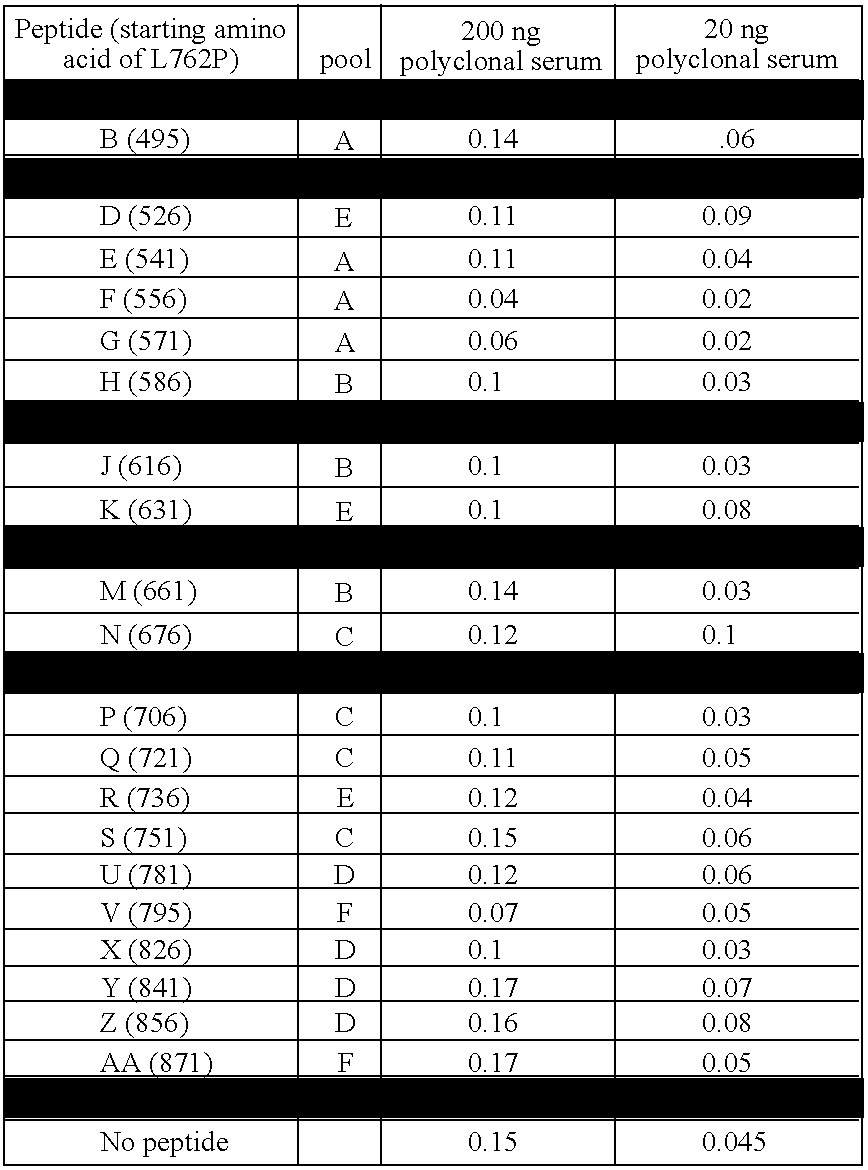Compositions and methods for the therapy and diagnosis of lung cancer
a technology for lung cancer and composition, applied in the field of cancer treatment and diagnosis, can solve the problems of lung cancer remaining difficult to diagnose and treat effectively, and 16% of lung cancers are discovered
- Summary
- Abstract
- Description
- Claims
- Application Information
AI Technical Summary
Benefits of technology
Problems solved by technology
Method used
Image
Examples
example 1
Isolation and Characterization of cDNA Sequences Encoding Lung Tumor Polypeptides
[0783]This example illustrates the isolation of cDNA molecules encoding lung tumor-specific polypeptides from lung tumor cDNA libraries.
A. Isolation of cDNA Sequences from a Lung Squamous Cell Carcinoma Library
[0784]A human lung squamous cell carcinoma cDNA expression library was constructed from poly A+ RNA from a pool of two patient tissues using a Superscript Plasmid System for cDNA Synthesis and Plasmid Cloning kit (BRL Life Technologies, Gaithersburg, Md.) following the manufacturer's protocol. Specifically, lung carcinoma tissues were homogenized with polytron (Kinematica, Switzerland) and total RNA was extracted using Trizol reagent (BRL Life Technologies) as directed by the manufacturer. The poly A+ RNA was then purified using an oligo dT cellulose column as described in Sambrook et al., Molecular Cloning: A Laboratory Manual, Cold Spring Harbor Laboratories, Cold Spring Harbor, N.Y., 1989. Firs...
example 2
Determination of Tissue Specificity of Lung Tumor Polypeptides
[0796]Using gene specific primers, mRNA expression levels for seven representative lung tumor polypeptides described in Example 1 were examined in a variety of normal and tumor tissues using RT-PCR.
[0797]Briefly, total RNA was extracted from a variety of normal and tumor tissues using Trizol reagent as described above. First strand synthesis was carried out using 2 μg of total RNA with SuperScript II reverse transcriptase (BRL Life Technologies) at 42° C. for one hour. The cDNA was then amplified by PCR with gene-specific primers. To ensure the semi-quantitative nature of the RT-PCR, β-actin was used as an internal control for each of the tissues examined. 1 μl of 1:30 dilution of cDNA was employed to enable the linear range amplification of the β-actin template and was sensitive enough to reflect the differences in the initial copy numbers. Using these conditions, the β-actin levels were determined for each reverse trans...
example 3
Isolation and Characterization of Lung Tumor Polypeptides by PCR-Based Subtraction
[0810]Eight hundred and fifty seven clones from a cDNA subtraction library, containing cDNA from a pool of two human lung squamous tumors subtracted against eight normal human tissue cDNAs including lung, PBMC, brain, heart, kidney, liver, pancreas, and skin, (Clontech, Palo Alto, Calif.) were derived and submitted to a first round of PCR amplification. This library was subjected to a second round of PCR amplification, following the manufacturer's protocol. The resulting cDNA fragments were subcloned into the P7-Adv vector (Clontech, Palo Alto, Calif.) and transformed into DH5α E. coli (Gibco, BRL). DNA was isolated from independent clones and sequenced using a Perkin Elmer / Applied Biosystems Division Automated Sequencer Model 373A.
[0811]One hundred and sixty two positive clones were sequenced. Comparison of the DNA sequences of these clones with those in the EMBL and GenBank databases, as described ab...
PUM
 Login to View More
Login to View More Abstract
Description
Claims
Application Information
 Login to View More
Login to View More - R&D
- Intellectual Property
- Life Sciences
- Materials
- Tech Scout
- Unparalleled Data Quality
- Higher Quality Content
- 60% Fewer Hallucinations
Browse by: Latest US Patents, China's latest patents, Technical Efficacy Thesaurus, Application Domain, Technology Topic, Popular Technical Reports.
© 2025 PatSnap. All rights reserved.Legal|Privacy policy|Modern Slavery Act Transparency Statement|Sitemap|About US| Contact US: help@patsnap.com



